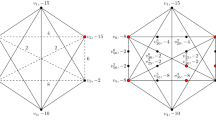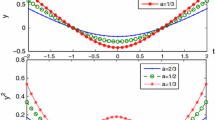Abstract
In this paper, we develop a Lagrangian decomposition based heuristic method for general quadratic binary programs (QBPs) with linear constraints. We extend the idea of Lagrangian decomposition by Chardaire and Sutter (Manag Sci 41(4):704–712, 1995) and Billionnet and Soutif (Eur J Oper Res 157(3):565–575, 2004a, Inf J Comput 16(2):188–197, 2004b) in which the quadratic objective is converted to a bilinear function by introducing auxiliary variables to duplicate the original complicating variables in the problem. Instead of using linear constraints to assure the equity between the two types of decision variables, we introduce generalized quadratic constraints and relax them with Lagrangian multipliers. Instead of computing an upper bound for a maximization problem, we focus on lower bounding with Lagrangian decomposition based heuristic. We take advantage of the decomposability presented in the Lagrangian subproblems to speed up the heuristic and identify one feasible solution at each iteration of the subgradient optimization procedure. With numerical studies on several classes of representative QBPs, we investigate the sensitivity of lower-bounding performance on parameters of the additional quadratic constraints. We also demonstrate the potentially improved quality of preprocessing in comparison with the use of a QBP solver.
Similar content being viewed by others
References
Adams, W.P., Forrester, R.J.: A simple recipe for concise mixed 0–1 linearizations. Oper. Res. Lett. 33(1), 55–61 (2005)
Adams, W.P., Forrester, R.J.: Linear forms of nonlinear expressions: new insights on old ideas. Oper. Res. Lett. 35(4), 510–518 (2007)
Alidaee, B., Kochenberger, G., Ahmadian, A.: 0–1 quadratic programming approach for optimum solutions of two scheduling problems. Int. J. Syst. Sci. 25(2), 401–408 (1994)
Barahona, F.: On the computational complexity of Ising spin glass models. J. Phys. A Math. Gen. 15, 3241 (1982)
Barahona, F., Grötschel, M., Jünger, M., Reinelt, G.: An application of combinatorial optimization to statistical physics and circuit layout design. Oper. Res. 36(3), 493–513 (1988)
Billionnet, A., Calmels, F.: Linear programming for the 0–1 quadratic knapsack problem. Eur. J. Oper. Res. 92(2), 310–325 (1996)
Billionnet, A., Elloumi, S.: Using a mixed integer quadratic programming solver for the unconstrained quadratic 0–1 problem. Math. Program. 109(1), 55–68 (2007)
Billionnet, A., Soutif, É.: An exact method based on Lagrangian decomposition for the 0–1 quadratic knapsack problem. Eur. J. Oper. Res. 157(3), 565–575 (2004a)
Billionnet, A., Soutif, E.: Using a mixed integer programming tool for solving the 0–1 quadratic knapsack problem. Inf. J. Comput. 16(2), 188–197 (2004b)
Billionnet, A., Faye, A., Soutif, É.: A new upper bound for the 0–1 quadratic knapsack problem. Eur. J. Oper. Res. 112(3), 664–672 (1999)
Boros, E., Hammer, P.: Pseudo-boolean optimization. Discrete Appl. Math. 123(1–3), 155–225 (2002)
Boros, E., Hammer, P.L., Tavares, G.: Local search heuristics for quadratic unconstrained binary optimization (qubo). J. Heuristics 13(2), 99–132 (2007)
Buchheim, C., Wiegele, A.: Semidefinite relaxations for non-convex quadratic mixed-integer programming. Math. Program. 141(1–2), 435–452 (2013)
Chaillou, P., Hansen, P., Mahieu, Y.: Best Network Flow Bounds for the Quadratic Knapsack Problem. Springer, Berlin (1989)
Chardaire, P., Sutter, A.: A decomposition method for quadratic zero-one programming. Manag. Sci. 41(4), 704–712 (1995)
Duman, E., Uysal, M., Alkaya, A.F.: Migrating birds optimization: a new meta-heuristic approach and its application to the quadratic assignment problem. Appl. Evolut. Comput. Pt I 6624, 254–263 (2011)
Ford, D.R., Fulkerson, D.R.: Flows in Networks. Princeton University Press, Princeton (2010)
Forrester, R., Greenberg, H.: Quadratic binary programming models in computational biology. Algorithmic Oper. Res. 3(2), 110–129 (2008)
Gallo, G., Hammer, P.L., Simeone, B.: Quadratic knapsack-problems. Math. Program. Study 12, 132–149 (1980)
Glover, F.: Improved linear integer programming formulations of nonlinear integer problems. Manag. Sci. 22(4), 455–460 (1975)
Glover, F., Kochenberger, G.A., Alidaee, B.: Adaptive memory tabu search for binary quadratic programs. Manag. Sci. 44(3), 336–345 (1998)
Glover, F., Alidaee, B., Rego, C., Kochenberger, G.: One-pass heuristics for large-scale unconstrained binary quadratic problems. Eur. J. Oper. Res. 137(2), 272–287 (2002)
Hanafi, S., Rebai, A.R., Vasquez, M.: Several versions of the devour digest tidy-up heuristic for unconstrained binary quadratic problems. J. Heuristics 19(4), 645–677 (2013)
Held, M., Wolfe, P., Crowder, H.: Validation of subgradient optimization. Math. Program. 6(1), 62–88 (1974)
Helmberg, C., Rendl, F.: Solving quadratic (0,1)-problems by semidefinite programs and cutting planes. Math. Program. 82(3), 291–315 (1998)
Iasemidis, L., Pardalos, P., Sackellares, J., Shiau, D.: Quadratic binary programming and dynamical system approach to determine the predictability of epileptic seizures. J. Comb. Optim. 5(1), 9–26 (2001)
Ivnescu, P.L.: Some network flow problems solved with pseudo-boolean programming. Oper. Res. 13(3), 388–399 (1965)
Klepeis, J., Floudas, C., Morikis, D., Tsokos, C., Lambriss, J.: Design of peptide analogues with improved activity using a novel de novo protein design approach. Ind. Eng. Chem. Res. 43(14), 3817–3826 (2004)
Lodi, A., Allemand, K., Liebling, T.M.: An evolutionary heuristic for quadratic 0–1 programming. Eur. J. Oper. Res. 119(3), 662–670 (1999)
Lu, Z.P., Glover, F., Hao, J.K.: A hybrid metaheuristic approach to solving the ubqp problem. Eur. J. Oper. Res. 207(3), 1254–1262 (2010)
Nyberg, A., Westerlund, T.: A new exact discrete linear reformulation of the quadratic assignment problem. Eur. J. Oper. Res. 220(2), 314–319 (2012)
Oral, M., Kettani, O.: A linearization procedure for quadratic and cubic mixed-integer problems. Oper. Res. 40(S1), S109–S116 (1992)
Palubeckis, G.: Multistart tabu search strategies for the unconstrained binary quadratic optimization problem. Ann. Oper. Res. 131(1–4), 259–282 (2004)
Pardalos, P.: Construction of test problems in quadratic bivalent programming. ACM Trans. Math. Softw. (TOMS) 17(1), 74–87 (1991)
Pardalos, P., Jha, S.: Graph separation techniques for quadratic zero-one programming. Comput. Math. Appl. 21(6–7), 107–113 (1991)
Pardalos, P., Jha, S.: Complexity of uniqueness and local search in quadratic 0–1 programming. Oper. Res. Lett. 11(2), 119–123 (1992)
Pardalos, P., Xue, J.: The maximum clique problem. J. Glob. Optim. 4(3), 301–328 (1994)
Paul, G.: An efficient implementation of the robust tabu search heuristic for sparse quadratic assignment problems. Eur. J. Oper. Res. 209(3), 215–218 (2011)
Picard, J., Ratliff, H.: Minimum cuts and related problems. Networks 5(4), 357–370 (1975)
Rendl, F., Rinaldi, G., Wiegele, A.: Solving max-cut to optimality by intersecting semidefinite and polyhedral relaxations. Math. Program. 121(2), 307–335 (2010)
Saremi, H.Q., Abedin, B., Kermani, A.M.: Website structure improvement: quadratic assignment problem approach and ant colony meta-heuristic technique. Appl. Math. Comput. 195(1), 285–298 (2008)
Sun, J.Y., Zhang, Q.F., Yao, X.: Meta-heuristic combining prior online and offline information for the quadratic assignment problem. IEEE Trans. Cybernet. 44(3), 429–444 (2014)
Xia, Y., Xing, W.X.: Parametric lagrangian dual for the binary quadratic programming problem. J. Glob. Optim. 61(2), 221–233 (2015)
Xu, Z., Hong, M.Y., Luo, Z.Q.: Semidefinite approximation for mixed binary quadratically constrained quadratic programs. SIAM J. Optim. 24(3), 1265–1293 (2014)
Acknowledgements
This research was partially supported by Air Force Office of Scientific Research Grant FA9550-08-1-0268. We also thank Dr. Oleg A. Prokopyev’s suggestions and comments on the research project.
Author information
Authors and Affiliations
Corresponding author
Rights and permissions
About this article
Cite this article
Chen, WA., Zhu, Z. & Kong, N. A Lagrangian decomposition approach to computing feasible solutions for quadratic binary programs. Optim Lett 12, 155–169 (2018). https://doi.org/10.1007/s11590-017-1125-x
Received:
Accepted:
Published:
Issue Date:
DOI: https://doi.org/10.1007/s11590-017-1125-x




